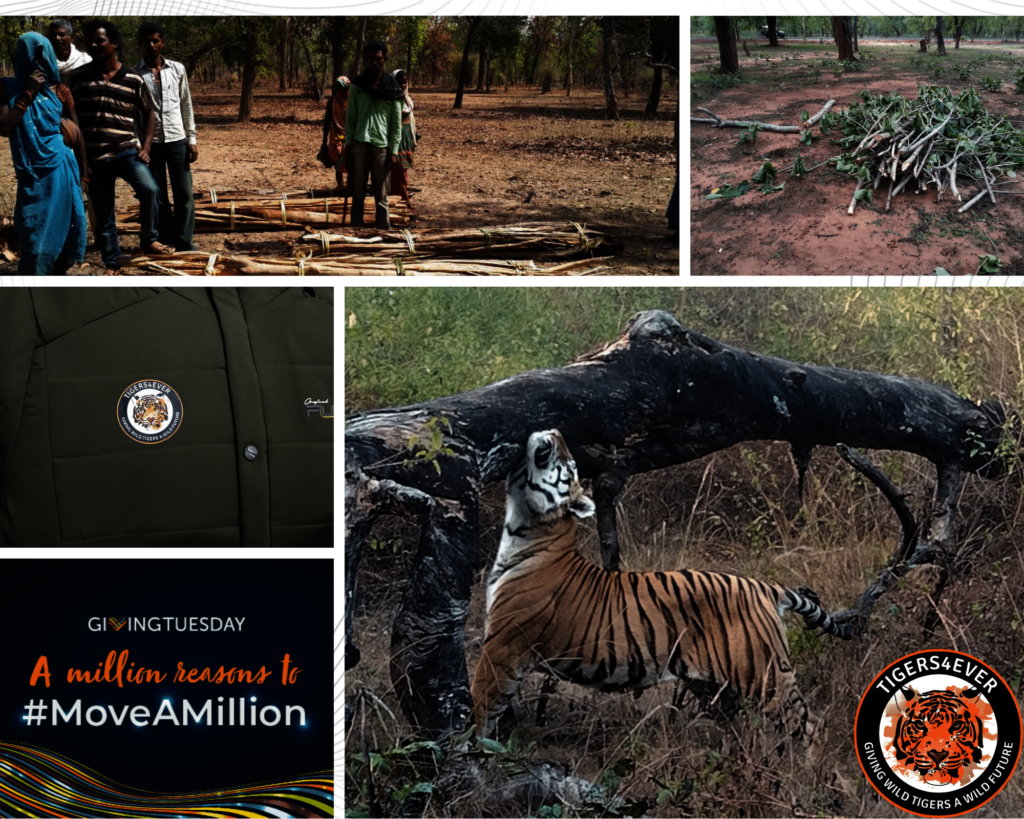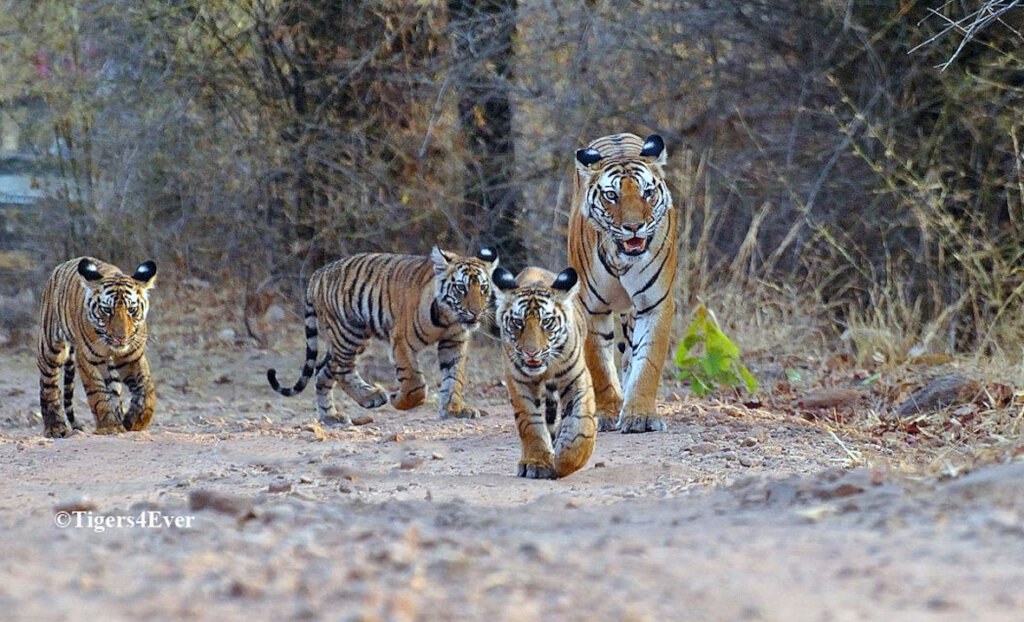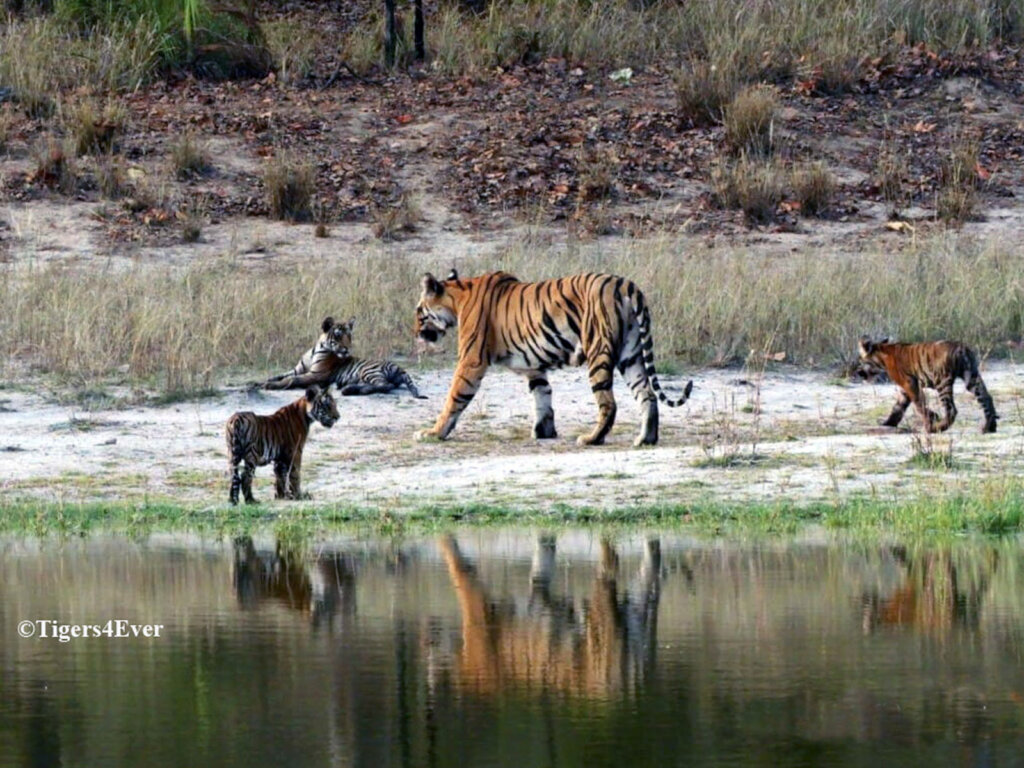By Dr. Corinne Taylor-Smith | Project Leader
Thank you for your continued incredible support for our Anti-poaching Patrols over the last few months, we know that these are testing times for many of you. Your generosity helped us to undertake quadruple-patrolling during the peak poaching monsoon season, and subsequently, we returned to triple-patrolling at the start of October 2022. Without your help this additional patrolling would be impossible. Your donations ensure that the growing wild tiger and cubs population is getting the best protection we can currently provide.
Winters are Getting Colder
After one of the strangest monsoon seasons since the formation of Tigers4Ever, back in June 2010, we are now preparing ourselves for another cold winter. Over the last few years winter morning and night time temperatures have dipped as low as 2°C (35°F) which is some 5°C (12°F) lower than the average for this time of year. The colder weather has a big impact on our patrollers too. We have provided warm socks and boots plus warm jackets in the past but these are no match for the temperatures which seem commonplace now. Two months ago we started to replace warm winter jackets for more than 1000 anti-poaching patrollers who struggle to cope with the biting cold whilst on their foot patrols at night and in the early morning. So far, with your help, we have managed to provide heavy duty warm jackets for 150 brave men and women who risk their lives to keep wild tigers safe, but it is not enough.
We need to raise another £17000 ($20910) to ensure that every patroller can carry out their vital duties as the freezing temperatures persist. Without this vital equipment, it will mean that vital patrolling will not cover the same distances as the temperatures plummet: leaving wild tigers and their cubs vulnerable to poachers’ snares and traps. For comparison, for those of you who live in the northern most countries in Europe, or the Northern US states and Canada – imagine walking around the streets on a December morning in just a T-shirt and summer trousers… Now imagine staying outside dressed that way for up to 12 hours. We’re guessing many of you would have gone inside or put a coat on long before the first hour was up, let alone 12 hours? That’s why we can’t expect the patrollers to stay outside all night in the freezing cold too. Where possible we will try to provide jackets which can be shared by two patrollers (one day shift/one night shift) but this won’t be a long term solution as the colder temperatures persist for longer each day. If you can help, each heavy duty warm winter jacket costs just £20 ($25) https://goto.gg/56553 and will not only keep a patroller protecting wild tigers for 12 hours per day but will provide much needed employment for up to 4 people living with wild tigers too.
Suspicious Activities
The late monsoon did no favours for the poor farmers who rely on heavy monsoon rains for good yielding rice crops. The news on NDTV has forecast a global shortage of rice for 2023! In fact it increased the financial impact on a community which has struggled to regain normality since before the COVID lockdown. During the dry monsoon period, our patrols noticed a significant increase in the wire traps and snares set to catch meat for food/to sell including jungle fowl, hares and wild boar. Whilst the intent of these snares and traps is to trap smaller animals for food/to sell the meat, they are indiscriminate and can kill leopards and tigers too! The increased patrolling was absolutely vital during this period especially around the periphery of the villages and close to seasonal rivers and streams where these heinous activities were most evident. In August, in particular our patrollers had to return to the patrolling vehicle multiple times due to the large haul of wires, ropes and rags which they had retrieve from this increased poaching activity!
This increase in poaching activity continued into September too, with another large haul of wires, ropes and other poaching aids recovered by our patrollers. Encroachment is also rife too. Our patrols have noted farmers extended their land into protected forest areas, and harvesting swathes of bamboo (which provides much need food for the wild elephants) to construct new fences around the encroached land. These actions will cause a double impact on the forest and its wildlife! They will lead to more wild elephant crop raids as they search for food; and the ecosystem of insects, birds, reptiles and small mammals which live amongst the bamboo and are vital for both seed dispersal and providing food for other wildlife is disrupted.
When these activities are coupled with the increased use of explosives in illegal fishing activities, it means that our patrollers must be on high alert at all times and that we must ensure that we can maintain a minimum of tripled patrolling especially throughout the festive period when poachers are notoriously active. https://goto.gg/28767.
Wider Impacts
Why do failing rice crops impact wild tigers? You might ask! The simplest answer is that the farming community around Bandhavgarh depends on three major sources of income throughout the year: rice, wheat and milk. When one of these fails, the loss of income has devastating impacts on a rural community, which already loses between 35 -65% of its annual crops to forest dwelling herbivores which raid human food and water resources. When this is coupled with wild elephant raids which can destroy a crop in a night, it becomes clear to see why human-wildlife conflict poses one of the biggest threats to wild tiger survival.
People become desperate for replacement income to feed themselves and their families, so they turn to the forest to plunder resources for anything they can eat or sell to survive. Commonly, this is harvesting fruit like mangoes and amla fruit, but there are more sinister elements too. Snare trapping jungle fowl, wild boar, deer, hares and other herbivores to sell or consume the meat, can also lead to predator deaths as unsuspecting tiger cubs and leopards fall foul of these traps. One of the strangest things to happen during the monsoon season was the cutting down of tendu trees, for wood to sell or burn. Tendu trees are important for the rural community around Bandhavgarh because their leaves are used to make Indian tobacco and are harvested in huge numbers during the first half of the year. Thus cutting down income provider trees makes no sense at all!
Another worrying trend during the monsoon season was the encroachment into the core forest to raid sand which has been used to fill the cattle proof trenches surrounding the forest so that cattle grazing areas expand to areas where it is not allowed. Cattle proof trenches are designed to stop domestic livestock from grazing in the core forest and to reduce the incidents of livestock (and their owners) being killed by predators, including wild tigers. What the culprits don’t seem to understand is when the cattle eat the food in the core forest it increases the likelihood of wild animals raiding the human crops. Thus education plays a huge part of our patrollers’ work.
A Plan to Increase Awareness
This year we’ve recruited more volunteers, including some in India, who’ve helped to distribute education packs to the children in rural villages and to gather new ideas to help educate these children about the importance of wild tigers and their forest home. We will continue to work with our new volunteers to ensure that learning about the forest and the wildlife within it will be fun for the children who will provide the next generation of wild tiger protectors.
We’re also developing new volunteering partnerships which will enable us to create bi-lingual educational resources on forest safety and protection for all age groups, including adults, so that our anti-poaching patrollers can distribute these when patrolling around villages and encountering villagers in the forest. We also hope to develop an audio resource which can be delivered by volunteers in the villages as part of a wider awareness and environmental protection programme.
What Else are we Doing to Help?
Work on our latest project to install two more permanent wildlife waterholes in the Kithauli-Biruhli buffer forest was hampered somewhat by the late monsoon rains, but we’re back on track now and hope to complete this work very soon. Once complete, these waterholes will provide year-round water in forest areas usually parched dry by drought before the end of January each year. They will bring the total number of Tigers4Ever waterholes to 14. Importantly, these waterholes will help to reduce the pressure on human water resources and thus reduce human-wildlife conflict. Tigers4Ever waterholes already provide year round water for more than two thirds of Bandhavgarh’s wild tigers and their prey. You can read more about our waterholes project here: https://www.globalgiving.org/projects/water-for-bandhavgarhs-tigers/reports/?subid=202182.
After seven long and hard years of patrolling, some of the equipment and clothing we provided to help anti-poaching patrols to keep wild tigers safe has worn-out and failed. More than 1000 anti-poaching patrollers urgently needed waterproof clothing and boots to protect them during the monsoon rains. Thanks to an urgent appeal and a kind donation from our new corporate partners, the Tiger Chi Community, we were able to provide waterproof clothing boots and powerful hand-held flashlights for 400 patrollers. We still need funds for a further 600 sets of waterproof clothing and boots (£12150/US$14900), however, we have time to raise these funds before the onset of the next monsoon. With the cold winter months ahead, we now need your help to provide a further 850 warm winter jackets so patrolling can continue on the coldest days and nights. To equip every patroller with a warm winter jacket will cost £20000 (US$25000); we have manged to provide 155 warm jackets to date but this only helps a small number of the 1000+ brave men and women who risk their lives each day to keep wild tigers. Any help you can give will be most welcome: https://goto.gg/56553. Even the smallest donation will be a huge help in these difficult times. Plus if you donate online on Giving Tuesday – 29 November 2022 we will gain a share of $1.2 million in bonus matched donations throughout the day. Definitely a good reason to help #MoveAMillion for wild tigers we think!
Making a Difference
Thanks to your continued support, we can cover an extra 1000 km (624 miles) of wild tiger territory per month with our increased patrols, in the current weather conditions – as the cold weather takes hold this may reduce. It is vital to ensure sufficient time to search for snares; traps and signs of poisoners around forest areas where human encroachment is widespread; and around the periphery of villages where crop raiding and livestock killing is rife. Increased patrolling helps us to curb human encroachment into wild tigers’ territories, and allows us to provide safety advice for those trying to protect their crops and livestock from wandering elephants and tigers respectively.
With more than 60 tiger cubs born since the start of the pandemic, we have many more wild tigers to keep safe now. So we still need your help. Your gift today, however large or small can make a huge difference as to whether Bandhavgarh’s wild tigers can survive these unprecedented threats:
Making your Gift Count Twice
Your new online monthly gift of £12 (US$15) per month won’t just help us to pay an anti-poaching patroller protecting wild tigers for 35 days per year; it will also qualify for a 100% match bonus on the first donation amount if you keep donating for 4 months or longer. That means when you donate at £12 (US$15) monthly in month 4 we will receive an extra £12 (US$15) from GlobalGiving to help us save wild tigers. Thus there has never been a better time to start a new monthly donation than now. (https://www.globalgiving.org/projects/saving-bandhavgarhs-wild-tigers/?show=recurring).
Without our help, we know that more wild tigers will die; and more humans will be mauled or killed due to encroachment or human-tiger conflict. Sadly, with every human life lost comes another threat to the wild tiger’s survival in the form of retaliation; thus we must protect both if we are to ensure that wild tigers can have a wild future.
Please don’t hesitate if you can help, your donation can be the difference between life and death for a wild tiger, as it helps to increase our patrolling when it is most needed. Every tiger and every tiger cub counts. Thank you for making our fight against poachers, the changing climate and human-animal conflict possible. (https://goto.gg/28767).
Links:
Project reports on GlobalGiving are posted directly to globalgiving.org by Project Leaders as they are completed, generally every 3-4 months. To protect the integrity of these documents, GlobalGiving does not alter them; therefore you may find some language or formatting issues.
If you donate to this project or have donated to this project, you can receive an email when this project posts a report. You can also subscribe for reports without donating.
Support this important cause by creating a personalized fundraising page.
Start a Fundraiser



